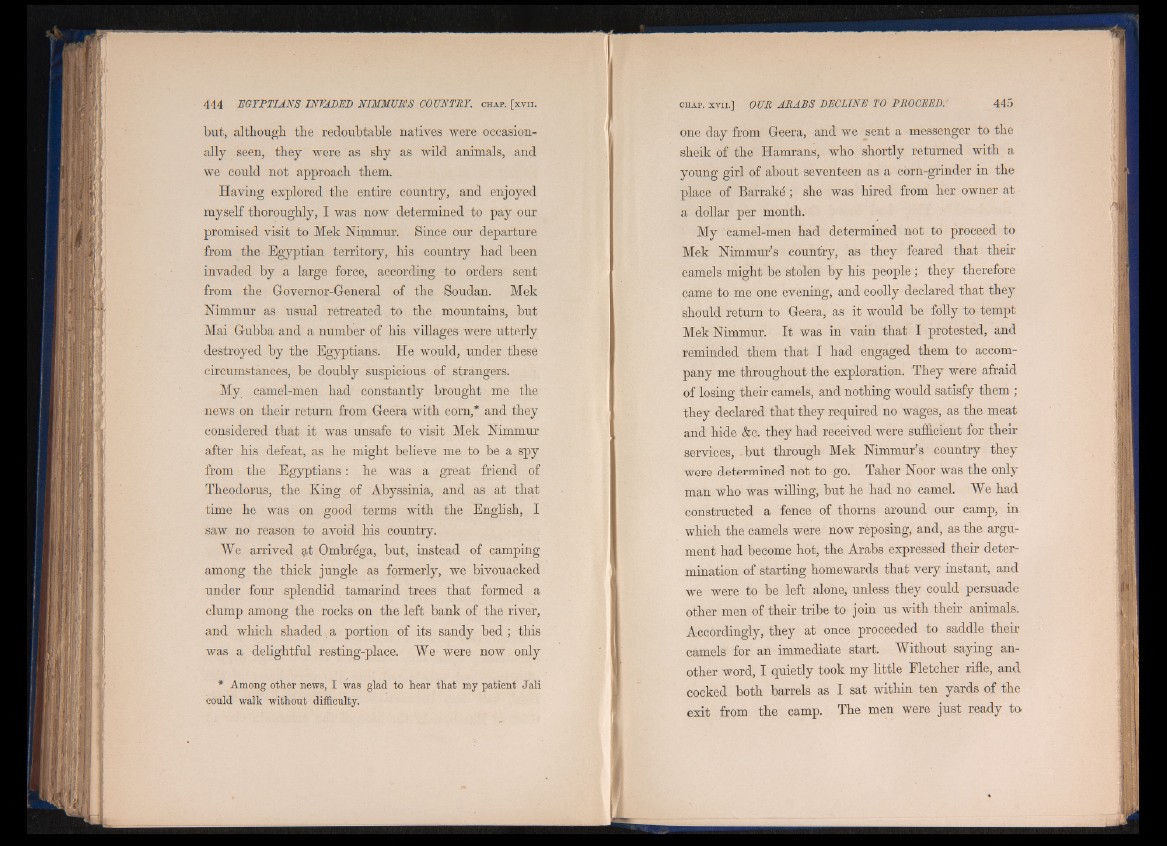
but, although the redoubtable natives were occasionally
seen, they were as shy as wild animals, and
we could not approach them.
Having explored the entire country, and enjoyed
myself thoroughly, I was now determined to pay our
promised visit to Mek Nimmur. Since our departure
from the Egyptian territory, his country had been
invaded by a large force, according to orders sent
from the Governor-General of the Soudan. Mek
Nimmur as usual retreated to the mountains, but
Mai Gubba and a number of his villages were utterly
destroyed by the Egyptians. He would, under these
circumstances, be doubly suspicious of strangers.
My camel-men had constantly brought me the
news on their return from Geera with com,* and they
considered that it was unsafe to visit Mek Nimmur
after his defeat, as he might believe me to be a spy
from the Egyptians; he was a great friend of
Theodorus, the King of Abyssinia, and as at that
time he was on good terms with the English, I
saw no reason to avoid his country.
We arrived ¡¿it Ombrega, but, instead of camping
among the thick jungle as formerly, we bivouacked
under four splendid tamarind trees that formed a
clump among the rocks on the left bank of the river,
and which shaded a portion of its sandy bed; this
was a delightful resting-place. We were now only
* Among other news, I was glad to hear that my patient Jali
could walk without difficulty.
one day from Geera, and we sent a messenger to the
sheik of the Hamrans, who shortly returned with a
young girl of about seventeen as a com-grinder in the
place of Barrakd; she was hired from her owner at
a dollar per month.
My camel-men had determined not to proceed to
Mek Nimmur’s country, as they feared tbat their
camels might be stolen by his people; they therefore
came to me one evening, and coolly declared that they
should return to Geera, as it would be folly to tempt
Mek Nimmur. It was in vain that I protested, and
reminded them that I had engaged them to accompany
me throughout the exploration. They were afraid
of losing their camels, and nothing would satisfy them ;
they declared that they required no wages, as the meat
and hide &c. they had received were sufficient for their
services, but through Mek Nimmur’s country they
were determined not to go. Taher Noor was the only
man who was willing, but he had no camel. We had
constructed a fence of thorns around our camp, in
which the camels were now reposing, and, as the argument
had become hot, the Arabs expressed their determination
of starting homewards that very instant, and
we were to be left alone, unless they could persuade
other men of their tribe to join us with their animals.
Accordingly, they at once proceeded to saddle their
camels for an immediate start. Without saying another
word, I quietly took my little Fletcher rifle, and
cocked both barrels as I sat within ten yards of the
exit from the camp. The men were just ready to